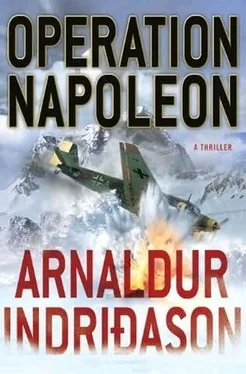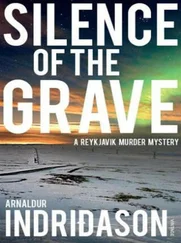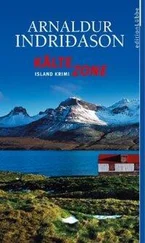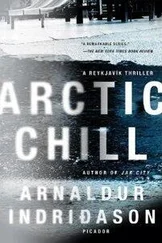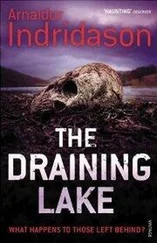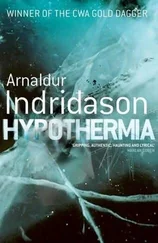The troops were soldiers of the 10th Infantry Regiment and 46th Field Artillery Battalion under General Charles H. Bonesteel, commander of the US occupying force. Some of the men had taken part in the army’s winter exercises on the Eiríksjökull glacier the previous year, but in practice few of them could even ski.
The expedition was led by one Colonel Miller. His men pitched camp just outside Höfn in barracks built by the British occupation force at the beginning of the war, from where they made their way to the glacier. By the time the soldiers arrived at the brothers’ farm, almost ten days had elapsed since they had heard the plane, days in which it had snowed without respite. The soldiers set up their base at the farm and the brothers agreed to act as their guides on the ice cap. They spoke no English but with a combination of gestures and sign language were able to show Miller and his men the direction of the plane, warning that there was little chance of finding it on or near the glacier in the depths of winter.
‘Vatnajökull is the biggest glacier in Europe,’ they said, shaking their heads. ‘It’s like looking for a needle in a haystack.’ It did not help that the snow would have obliterated all signs of a crash-landing.
Colonel Miller understood their gestures but ignored them. Despite the heavy going, there was a passable route to the glacier from the brothers’ farm and in the circumstances the operation went smoothly. During the short winter days, when the sun was up only from eleven in the morning until half past five, there was little time for searching. Colonel Miller kept his men well in order, though the brothers quickly discovered that most of them had never set foot on a glacier and had scant experience of winter expeditions. They guided the soldiers safely past crevasses and gullies, and the men set up camp in a depression at the edge of the glacier, about 1,100 metres above sea level.
Miller’s troops spent three weeks combing the slopes of the glacier and a five square kilometre area of the ice cap itself. For most of the time the soldiers were lucky with the weather and coordinated their searches well. They divided their efforts, one group searching in the foothills from a camp set up near the farm, while the other group camped on the glacier and scoured the ice for as long as daylight lasted. When darkness fell in the afternoon, the soldiers assembled back at the farm base camp where they ate, slept and sang songs familiar to the brothers from the radio. They slept in British-issue mountaineering tents, sewn from double layers of silk, and huddled for warmth around primuses and oil lamps. Their heavy leather coats reached below the knee and had fur-lined hoods. On their hands they wore thick, coarsely knitted gloves of Icelandic wool.
No sign of the aircraft was found on this first expedition apart from the rim of the nose wheel, of which Colonel Miller immediately took charge. It was the brothers who made the discovery, about two kilometres on to the ice cap. Beyond this fragment, the ice was smooth in every direction and there was no evidence that an aircraft had crashed or made a forced landing there. The brothers said that if the plane had gone down on that part of the ice cap, the snow had probably drifted over the wreckage already. The glacier had swallowed it up.
Colonel Miller was like a man possessed in his search for the plane. He appeared to feel no tiredness and won the admiration of the brothers, who treated him with a mixture of affection and respect and were eager to do anything for him. Miller consulted them a great deal for their local knowledge and they came to be on friendly terms. But eventually, after the expedition had twice been hampered by severe weather on the ice, the colonel was forced to abandon his search. In the second storm, tents and other equipment were buried in snow and lost for good.
There were two aspects of the expedition that puzzled the brothers.
One day they came upon Miller alone in the stable block, which adjoined the barn and cowshed, taking him by surprise as he stood by one of the horses in its stall, stroking its head. The colonel, whose courage and authority over his men was striking, had to all appearances taken himself quietly to one side to weep. He cradled the horse’s head and they saw how his shoulders shook. When one of them cleared his throat, Miller started and glanced their way. They saw the tracks of tears on his dirty cheeks, but the colonel was quick to recover, drying his face and pretending nothing had happened. The brothers had often discussed Miller. They never asked him how old he was but guessed he could be no more than twenty-five.
‘This is a handsome animal,’ Miller said in his own language. The brothers did not understand him. He’s probably homesick, they thought. But the incident stayed in their minds.
The other matter which aroused the brothers’ interest was the wheel itself. They had had time to examine it before Colonel Miller found them and confiscated it. The tyre had been wrenched off the wheel so only the naked rim hung from the broken landing gear. For a long time afterwards they wondered about the fact that the wheel rim was inscribed with lettering in a language they understood even less than English.
KRUPPSTAHL.

CONTROL ROOM, BUILDING 312, WASHINGTON DC,
WEDNESDAY 27 JANUARY
The building stood not far from the Capitol in Washington DC. Originally a warehouse, it had undergone an elaborate conversion to house one of the capital’s many clandestine organisations. No cost had been spared in the conversion, either inside or out. Now, giant computers hummed day and night, receiving information relayed from space. Satellite photographs belonging to the US military intelligence service were collected in a database, and there the information was processed, analysed and catalogued, and the alert raised if anything irregular came to light.
In official documents the warehouse was known simply as Building 312, but the organisation it housed had played a fundamental role in the US army’s defence programme during the Cold War. Established shortly after 1960 during the most intense period of mutual suspicion, its chief role had been to analyse spy photographs taken of the Soviet Union, China and Cuba, and any other nations classed as enemies of the United States. After the end of the Cold War, its role included monitoring terrorist bases in the Middle East and conflicts in the Balkans. The organisation controlled a total of eight satellites in orbits ranging from 800 to 1,500 kilometres above Earth.
The director of the organisation was General Vytautas Carr, who stood now in front of a monitor which filled an entire wall of the first-floor control room, staring intently at a batch of images that had been drawn to his attention. It was cool in the room on account of the fans for the twelve powerful computer units which hummed ceaselessly in a cordoned-off section. Two armed guards stood at the doors. The room was intersected by four long banks of flickering screens and control panels.
Carr was not far off his seventieth birthday and ought to have taken retirement but for a special dispensation by the organisation. He was almost six foot five, his back ramrod straight, unbowed with age. He had been a soldier all his life, had served in Korea, and directed and shaped the operations of the organisation as one of its most dynamic chiefs. He was dressed in civilian clothes, a double-breasted dark suit. The monitor on the wall in front of him was reflected in his glasses, behind which a pair of small, shrewd eyes were concentrating on the two screens at the top left.
Читать дальше
